
American Politics and the 2020 Presidential Elections - A Reading List
The United States seems to be embroiled in one of the most contentious electoral battles in its history. In fact, presidential elections have become ever more contested over the past decades. In the past few years, and even centuries, researchers and authors have sought to explain issues that are currently at the forefront of American political discourse: race, democracy, economic inequality, the influence of money in American politics, and more. How did American democracy get where it is now?
This reading list aims to provide an (incomplete) selection of works from the Leiden University Library (UBL) collections that could provide insight into the deeper causes of discontent in the United States today. All books in the list below are available in the UBL catalogue. To borrow them, click the link in the title, or search our catalogue.
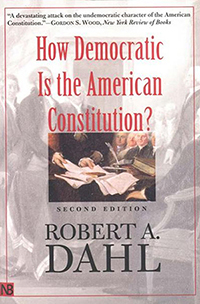
How democratic is the American Constitution?
2003
In 2016, Donald J. Trump entered the White House despite losing the popular vote to Hillary Clinton by 4 million ballots. This year, an imbalance between the popular vote and the Electoral College is again a possibility; some analysts have argued that Joe Biden could beat Trump by 8 million votes yet still lose the Electoral College. In this thought-provoking study that includes insightful essays on the Electoral College, the Congress, the Supreme Court and the presidency, Dahl shows that the U.S. Constitution enshrined a highly-limited form of democracy. Although it was written long before Trump swore the oath of office, Dahl’s warnings of the undemocratic elements in the American system are more relevant than ever.
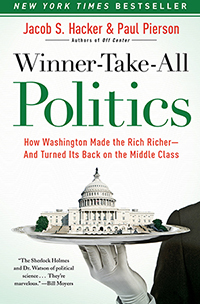
Winner-take-all politics: how Washington made the rich richer - and turned its back on the middle class
2010
Over the past five decades, income inequality in the United States has exploded. The three richest individuals in America collectively now hold more wealth than the bottom 50% of the domestic population, some 160 million people. The dramatic increase at the top of the income ladder has had a wrenching effect on working- and middle-class Americans—a development significantly worsened by the Covid-19 pandemic. Indeed, in June 2020 an estimated 17.9 percent of children in the United States were not getting enough to eat due to a lack of resources. In this compellingly-written book, Hacker and Pierson piece together the story of how this happened, tracking declining strength among unions and public interest groups and the rising power of corporate lobbies and new-right activists to show how America’s current inequality was engineered by specific policy choices.
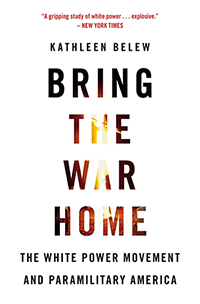
Bring the War Home: The White Power Movement and Paramilitary America
2018
In the October 2020 presidential debate, Donald Trump’s refusal to condemn a white power organization was widely interpreted as encouraging the far right to mobilize in the lead-up to the election. Indeed, during his four years in the Oval Office, Trump has fueled fears on the right that leftist activists and their supporters in Congress are intent on destroying American capitalism and uprooting the civil liberties at the core of the American experience; the Southern Poverty Law Center recently reported that white nationalist hate groups in the US have increased 55% during the Trump era. Yet as Belew’s deeply researched book makes clear, the white power movement has deep roots in American history. Tracking the evolution of the movement from the Vietnam War era to the 1995 Oklahoma City bombing, Belew reveals a volatile mix of racism and violence that remains central to white power identity.
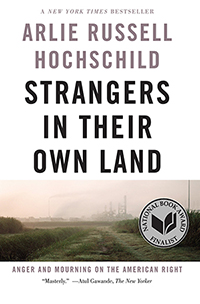
Strangers in their own land: anger and mourning on the American right
2016
Why do millions of working- and middle-class Americans vote against their interests? Sociologist Arlie Russell Hochschild traveled to southwestern Louisiana to figure out why so many voters cast their ballots for the Republican Party despite the fact that after decades of Republican state government control, Louisiana is at the bottom of national rankings in areas such as public education and social services, and at the top in environmental degradation and incarceration. Having lived among the people she describes, the author very much relies on empathy to come up with her appraisal of the Louisiana Republicans whose ideas she disagrees with. Hochschild’s conclusions illuminate core concerns that animate grassroots right-wing activism and offer an essential primer for understanding Trump voters.
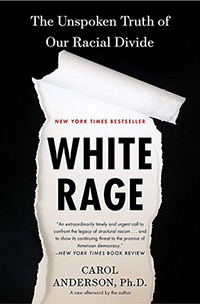
White rage: the unspoken truth of our racial divide
2017
On May 25, 2020, George Floyd, a 46-year-old African American, was killed in Minneapolis after being handcuffed and pinned to the ground by a police officer’s knee. The incident was captured on video and quickly sparked massive protests against systemic racism and police brutality across the United States and around the world. In this compelling and accessible book, Carol Anderson gives the backstory to the ongoing struggle for civil rights during the Trump presidency. White rage from the Reconstruction era to the present, Anderson convincingly argues, translated into concerted and continuous efforts to keep African Americans politically disenfranchised and economically exploited.
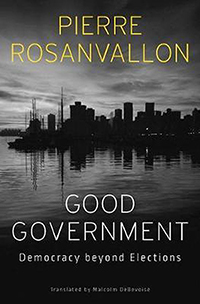
Good Government: Democracy Beyond Elections
2018
This translation of one of the recent works of prominent French political historian and theorist Pierre Rosanvallon depicts one of the responses to the crisis of democratic legitimacy that characterizes many Western countries these days. Because the representatives of the legislative branch have failed, in the eyes of many voters, to properly represent the people’s interests, the electorate has turned to the charismatic leadership of a strong executive power. How to deal with this new authority—this system of an “imperial presidency” or “presidentialism”--is one of the questions the book raises.
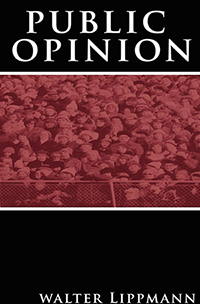
Public Opinion
1922
Undermining one of the core concepts of democratic theory, journalist and public intellectual Walter Lippmann reveals the problematic nature of the concept of “public opinion.” Psychological studies (Freud’s work included) show the human mind to be irrational; its commercial aspects prevent the press from objectively informing its readers; in our efforts to evaluate ideas and opinions we are not self-sufficient individuals but dependent on authorities. Lippmann considers the “expert” who helps establish facts on the basis of which politicians can govern the solution to this post-truth, post-factual world. While deemed unconvincing by many Lippmann scholars, his remarks about the role of “experts” raise important questions about the conditions for participation in politics and the idea of “well informed citizens.”
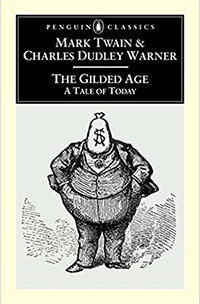
The Gilded Age: A Tale of Today
1873
Mark Twain’s and Dudley Warner’s novel explain why Americans voted Trump into office by showing the appeal of distorted depictions of reality pervading American society. The two authors show how in the domains of politics, economics, and morality misplaced and rosy-romantic notions create a dream world, or virtual reality, that prevents Americans from understanding what “really” happens and makes them prone to follow those able to use the “right” rhetoric.
